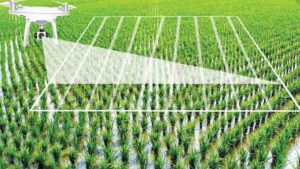By Onome Amuge
The role of technology in the production of a very essential part of the world is growing at a fast pace due to a revolving world. As such, technological advancements in agriculture and food processing have been considered a serious approach in preserving resources,ensuring greater revenue and also sustaining a growing global population.
The United Nations Department of Economic and Social Affairs, in a recent report, projected that the world’s population would be over nine billion by 2050, noting that a 70 per cent increase in agricultural production would be required to meet the demand of the population growth.
Owing to the growing demand for food and grains, analysts have noted that the growth in the agricultural market is gradually being driven by artificial intelligence, marked by the increasing adoption of digital and smart agriculture equipment and technologies.
Artificial Intelligence (AI) is the ability of a digital computer, computer-controlled machine or robot to perform tasks commonly associated with intelligent beings like humans.
According to Research and Markets, the world’s largest market research store, the global artificial intelligence in agriculture market was valued at $1.517 million in 2022 and is expected to reach $4.096.1 million in 2027, following a compound annual growth rate (CAGR) of 21.98 per cent during 2022-2027.
Over the years, Artificial Intelligence has served as a relevant tool in optimising and caring out particular human activities such as planting and harvesting, increasing productivity, improving working conditions and using natural resources more efficiently.
In addition, systems for crop and soil monitoring are leveraging machine learning, remote sensing, satellite imagery, drones, and precision technologies for informed production andmanagement.
AI’s role in the food industry is becoming increasingly important due to its ability to reducewaste, predict markets for products, enable round the clock efficient and effective monitoring, augment sanitation, manage cost and increase revenue.
Based on the growing trajectory regarding the utilisation of Artificial Intelligence, it has become a no-brainer that its adoption and deployment in Nigeria has a vital part to play in transforming food systems and helping to address food and nutrition insecurity. In the agricultural sector, a social enterprise organization that provides support for smallholder farmers in Nigeria to become more profitable.
Babban Gona, a social enterprise organisation that provides support for smallholder farmers in Nigeria, pointed out that agricultural businesses are adapting Artificial Intelligence to create new cost-effective business models and to provide the information they need to reach small farmers in emerging markets.
It noted that agricultural technology firms using Artificial Intelligence mostly with extensive farmers have begun to display their potentiality and are looking to transform their ideas into reality.
According to Babban Gona, improvements in AI solutions in agriculture have made it possible to develop applications and tools that provide farmers with precise data and controlled farming, weather forecasting, precision farming and predictive analytics, soil and plant health monitoring system and other development.
It, however, stressed that governments, investors,and industry will need to collaborate in addressing data, infrastructure, and human capital gaps before commercial AI integration becomes feasible at a larger scale in the country.
Considering the challenges surrounding the application of artificial intelligence in Nigeria’s agricultural sector , Wale Oyekoya, an agricultural consultant and CEO of Bama Farms, Lagos, opined that the issue with Nigeria is that the country has been more passive in the adoption of such technological advancements.
“Most Nigerian farmers are based in rural areas and a huge number do not possess technical expertise or innovations and access to Artificial Intelligent tools,” he noted.
Gbolagade Ayoola, President and founder of Farm and Infrastructures Foundation, an organisation for promoting policy best practices in agriculture and rural development, averred that there is a need for effective capacity building to strengthen the most vulnerable group in agricultural production with requisite knowledge and information necessary to promote utilisation of Artificial Intelligence.
He added that a rural infrastructure approach by the government and agriculture stakeholders with a focus on Artificial Intelligence investments to boost production, storage,processing and marketing infrastructure is essential to boost agriculture productivity and set the country on the path to future farming techniques.
Reagan Robinson, a research analyst and lecturer, Rivers State University of Education, in a research article on AI adoption for improved agriculture productivity, highlighted the following recommendations to enhance its development. These include:
– Innovative research and policy making on the use of AI technology in workplace management, monitoring and hiring of personnel.
-Development of standards to track the provenance of different AI development, and use of training data sets throughout its life cycle.
-Proper processes to AI mitigation and unbiased strategies beyond a narrowly technical approach.
– Hiring experts from disciplines beyond computer science and engineering and ensure they have good managers to AI development and usage.
– Collaborations between the government,agritech firms, universities, conferences and other stakeholders to foster the development of AI technology through investments in AI research and development.









